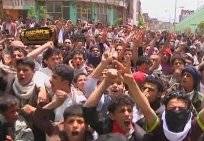One person has died in the city of Hyderabad and at least eight people have been injured in protests across Pakistan against a video mocking Islam.
In the southern port city of Karachi, around 1,000 protesters began throwing stones and police responded with teargas and by firing into the air, Fayyaz Laghari, a senior policeman, said on Sunday.
The demonstrations came as violent protests against the anti-Islam video clip appear to have leveled off - after at least 10 people died across the Middle East and North Africa on Friday, despite a few fresh gatherings across the Muslim world.
"Thousands of protesters ... started marching towards the US consulate in Karachi," said Al Jazeera's Imtiaz Tyab, reporting from Pakistan.
"The [Majlis-e-Wahadat-e-Muslimeen group's] spokesman told us that they had planned to protest peacefully", until the police took action against them. Our correspondent continued, "Now of course, Pakistani security forces have been on high alert over the past several days."
Karachi police officer Mohammad Ranjha said police fired tear gas and water cannons at the protesters after they broke through a barricade, but many said police also used rubber-coated steel bullets to disperse the crowd.
Police and private security guards outside the consulate fired shots in the air as the crowd approached.
Richard Silver, a spokesman for the US consulate, said: "There has been no damage or injury to any of our personnel."
Also on Sunday, protests continued in Afghanistan, Turkey, Niger and elsewhere, as Malaysia sought to follow Indonesia and India into having YouTube parent company Google block links to the film.
Meanwhile, the US military has said it has no major plans to bolster its forces in the Middle East despite a week of violent protests targeting diplomatic outposts, Defense Secretary Leon Panetta said on Sunday.
With a substantial force already deployed in the region coupled with two US Marine “counter-terrorism” teams sent to Libya and Yemen, the military has the ability to respond as necessary to protect American diplomats, Panetta told reporters before arriving in Tokyo on an Asian tour.
As protests spread over an inflammatory American-made film from Tunisia to Indonesia, US plans to send a Marine unit to protect the embassy in Sudan had to be dropped after the Sudanese government rejected the US request, the official SUNA news agency reported.
The US ambassador to the UN says those who have lost out during the transition to democracy in the Mideast are to blame for the recent mob violence against the US.
Susan Rice cited the time of dramatic change in the region and said that the US understands that when democracy starts to take root, that may lead to turbulence in the short term.
She told CNN's "State of the Union" that just as people across the Mideast no longer will allow their lives "to be hijacked by a dictator, they're not going to allow extremist mobs to hijack their future and their freedom".
"[President Barack Obama's] interventions, his leadership, has ensured that in Egypt, in Yemen, in Tunisia, in Libya, and many other parts of the world, that leaders have come out and made very plain that there's no excuse for this violence."
Blocking offensive video
Google refused the White House's request to take the video down entirely, but has been preventing access in individual countries.
Malaysia has asked Google to block access to the anti-Muslim video clip blamed for sparking mob attacks against US embassies and consulates across the Middle East.
Information Minister Rais Yatim says Malaysian authorities want the clip removed from YouTube because of the "explosive commotions and repercussions at hand".
Google already blocked the clip in Libya and Egypt, citing "the very sensitive situations" there.
The company also blocked it in India and Indonesia after their governments told YouTube the video broke their laws.
YouTube began restricting access to videos of an anti-Islamic film in the world's most populous Muslim nation, a government official said on Sunday.
"Google, which is YouTube's parent company, emailed us on Thursday evening to say it had blocked Indonesia's access to 16 URLs related to the 'Innocence of Muslims' videos on the site," Communications and Information Ministry spokesman Gatot Dewa Broto told the AFP news agency.
Extracts of the film were still available on the video-sharing website on Sunday, but Broto said Google was "making special effort" to prevent the film from being watched in Indonesia.
"We understand that it takes time for Google to block everything as people continue to upload those sensitive videos. We appreciate Google's cooperation," he said.
Broto said the government also wrote to Blackberry maker Research In Motion on Friday to filter the videos on its smartphones.
India on Sunday confirmed that Google had blocked access in the country to the film.
'Did not warrant killing'
Yemenis on Sunday ignored calls to protest the deployment of Marines at the US embassy in Sanaa just days after demonstrators stormed the compound to protest the controversial video.
Sunday's planned demonstration in front of Yemeni President Abd-Rabbu Mansour Hadi's residence in the capital was cancelled by organizers, the Houthi rebel movement from the north, after people failed to show up, an AFP correspondent at the scene reported.
The Houthis are believed to have participated in the violent protests outside the US embassy last Thursday which left four people dead.
Meanwhile, a group of protesters on Sunday shouted anti-US slogans in the Turkish capital. The group of around 50 Muslims shouted "Allahu Akbar" and "Death to America" some 100m from the US embassy in Ankara as riot police blocked a road near the compound for security reasons.
PHOTO CAPTION
Anti-American protests rage near the U.S. Embassy in the Yemeni capital, a day after demonstrators stormed the compound, angry over a film blasphemous to Islam.
Al-Jazeera


 Home
Home Discover Islam
Discover Islam Quran Recitations
Quran Recitations Lectures
Lectures
 Fatwa
Fatwa Articles
Articles Fiqh
Fiqh E-Books
E-Books Boys & Girls
Boys & Girls  Articles
Articles










